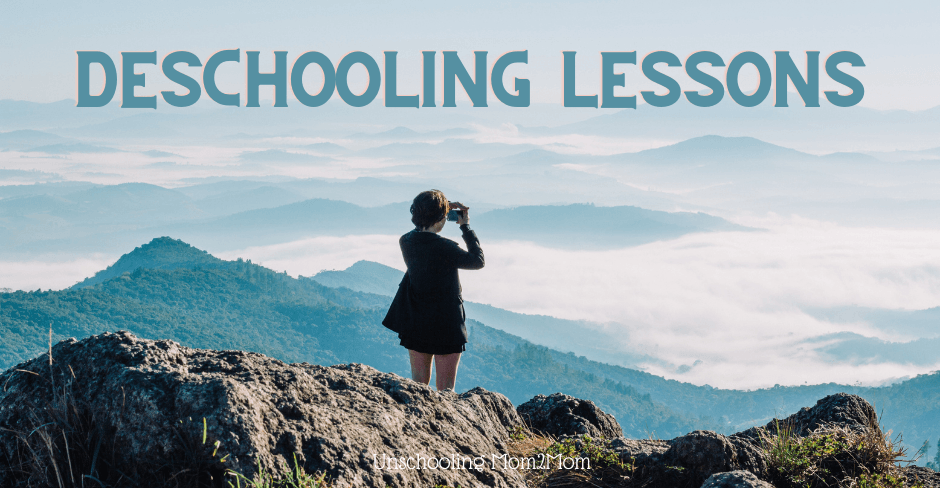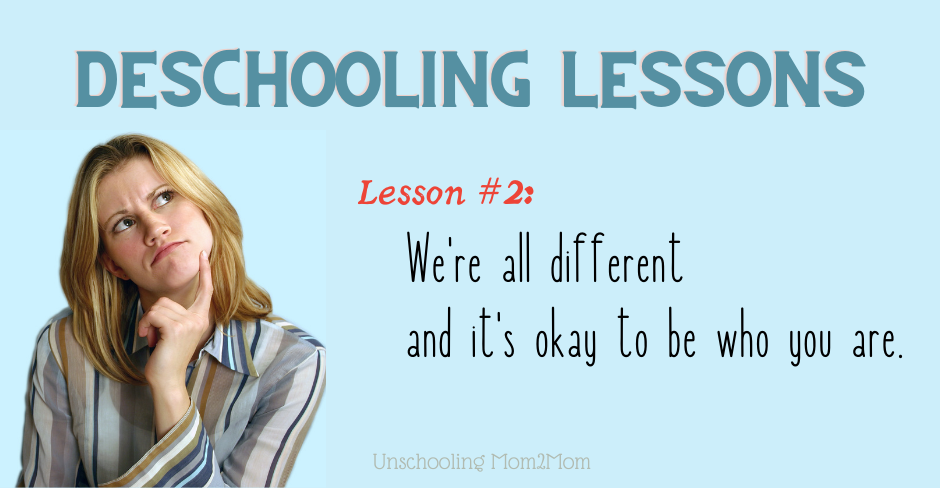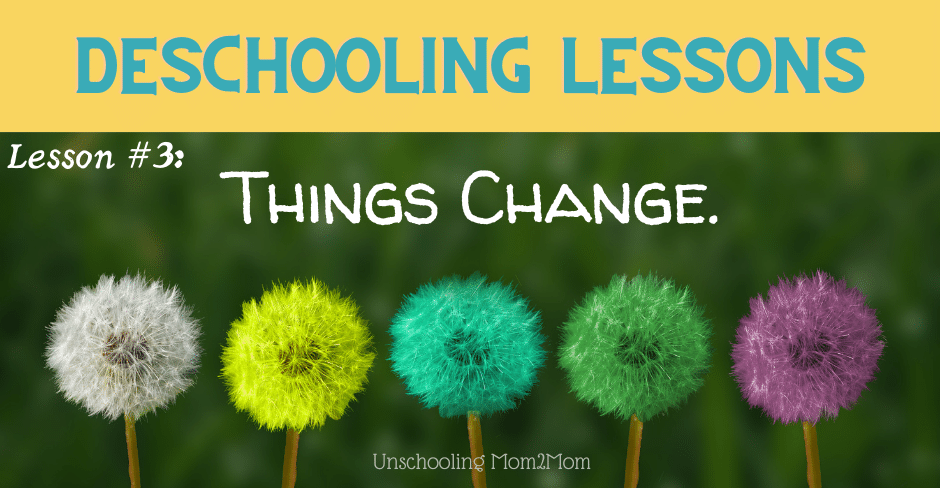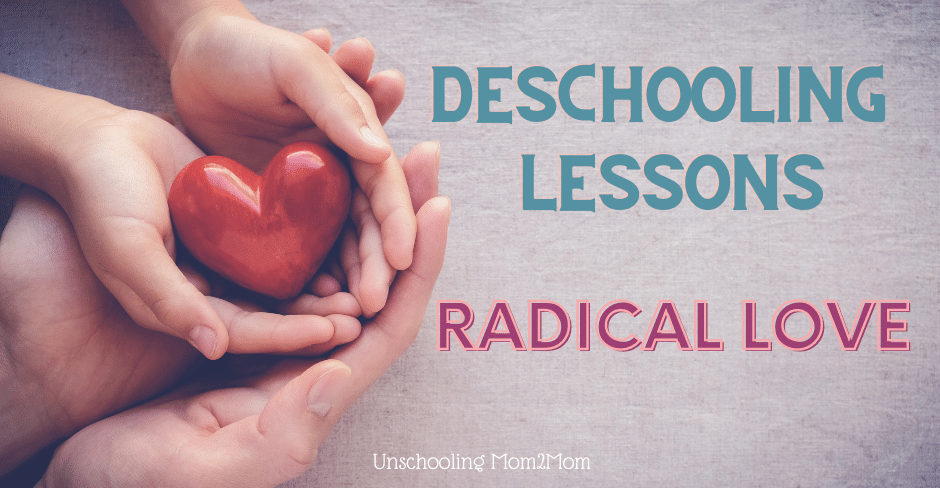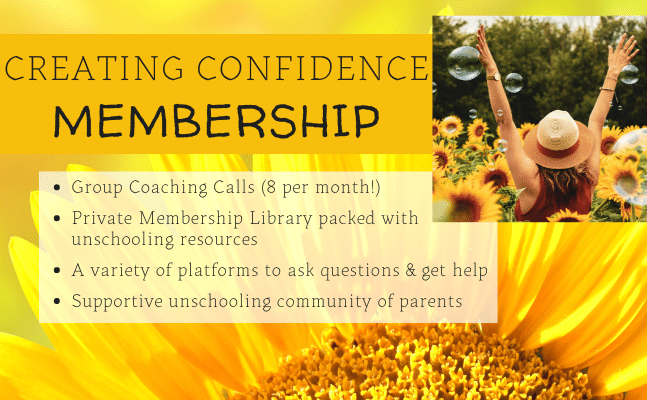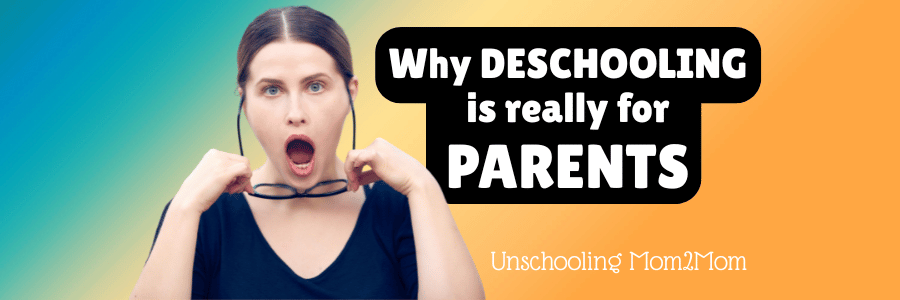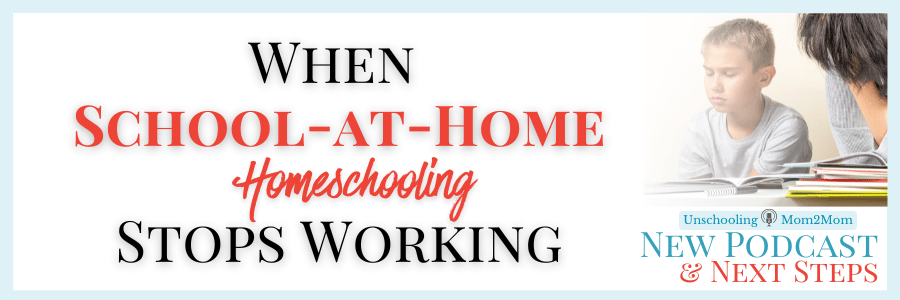Deschooling “Lessons”
Or... more aptly titled:
Important Lessons I Have Had to (UN)learn During My Deschooling So Far
Guest Blogger, Susan Walker, is a life-long learner, and mother of two—a grown daughter and a teen-aged son. She and her husband have been de-schooling and her son has been unschooling for the last four years.
When we first decided to try unschooling, I understood the deschooling process as simply relaxing around certain standards and deeply inculcated ideas about how learning happens and what type of learning people need. That is a pretty big enterprise in and of itself. But as I attempted to tackle those ideas, seeking help from wise women who had boldly gone before me, I heard from them and experienced for myself over and over that unschooling cannot flow without also deschooling ideas and expectations about myself, children in general, my own children, parent/child relationships, and all of my relationships, in addition to those ideas about what education is and how to do it.
In her recent book, "Raising Free People: Unschooling as Liberation and Healing Work" , Akilah Richardson describes deschooling as:
"shedding the programming and habits that resulted from other peoples' agency over your time, body, thoughts, and actions; and designing and practicing beliefs that align with your desire to thrive, be happy, and succeed".
Yep. That pretty well describes it! A tall order, but so rewarding personally, and until you've done a certain amount of that (alas, it is a never-ending process), you continually run into barriers, conflicts, and pitfalls that interfere with the holistic nature of self-directed learning that makes it so effective.
Each person's quest is uniquely personal, so my lessons may or may not be the most relevant to others. But sharing my deschooling lessons so far may help someone understand the types of issues that can get in the way of letting unschooling and our lives with our children flourish.
Lesson #1.
I'll start with the easiest!
What I thought deschooling was all about:
Learning and what constitutes an education.
I was super schooled and schooly. I loved the academic part of school, though I dropped out in high school for other reasons, and went on to college and graduate school. So I was extremely indoctrinated in schoolish ways, and a lot of my ego and self worth were wrapped up in my school experiences. My husband is similar in that respect.
Our son was born when our first child was 13 and had been through many years of school. By the time our son reached kindergarten age, I already had some doubts about how necessary school was. The fact that I dropped out at 15 and then was able to go to college and do fine there made me wonder if the 3 years of high school that I missed were really worth it. Our older daughter also did well in school, but they gave her a lot of pointless busywork. She always had her own big projects going on at home, and was digging, learning about things and developing skills that interested her on her own. I hated that she “had” to go to school, when I could see how silly some of the things they were making her spend her time on were. But we didn’t see any alternatives back then except for very expensive online schools that were just starting up, and she persisted and made it through.
When it became clear that our son was not happy or thriving in school, though, we began to explore options, including homeschooling, with some other parents who weren’t happy with the local school options either. In my schoolish assessment, I believed that in spite of having several advanced degrees, I wouldn't be able to teach my son myself, because none of those degrees were in teaching. Some of the other parents had seen videos and read about unschooling (which apparently wouldn't require me to teach!), and were very excited about that option, so I started looking into it.
Now five years later, we have been unschooling from the time we took our son out of school after 2nd grade. It was rough at first though, because even though I got it intellectually, in practice I wasn't convinced it was "working". It certainly didn't look the way I had imagined it would. My older daughter’s independent, creative pursuits had been very in line with what is acceptable and valued in the schoolish mindset, but my son was mostly interested in video games and YouTube videos. That truly freaked me out because I couldn’t understand or see what he was learning from those activities, so often denigrated and vilified by our society, and I was worried that he was falling behind in all of the subjects taught at school and not doing anything productive.
It was frustrating to me, also, that I couldn’t approach this like I had approached everything else I had wanted to learn about before. I couldn’t just pick up a book and study it and then be an unschooler. It took a different type of learning, which involved an incredible amount of self examination, reflection, and changes in my own behavior--- just living it. I had so much basic stuff to unlearn, which was actually more important than learning new things, an exciting twist that aroused my curiosity and tickled my schooly mind.
At the same time, because homeschooling is theoretically permitted where I live, but isn’t actually done much and isn’t regulated at all, I felt that I needed to be able to explain intelligently what we were doing if we were ever questioned by authorities. For this, I resorted to my well-developed academic skills and delved into an investigation of learning theory, self-directed learning and education, and learning through video games. I found a world of relevant research out there! We’re focused on "subjects" and content in the school system, but video games teach all kinds of important skills that aren’t explicitly covered in schools, such as decision-tree style thinking, situational awareness, dimensional reasoning, spatial visualization and communication. At the same time, content comes from different games, as well as life experiences and activities, family discussions and discussions with friends, videos, books, and movies. I was also concerned that most of his socializing was done online, and I was pleasantly surprised to see how much research had been done about the nature and benefits of virtual relationships.
I put together a well-documented educational plan based on educational and learning theory, explaining learning through play, self-directed learning, and learning through video games, and including why we don’t follow a set curriculum and how we do assessments.
Falling back on my schoolish, academic ways reassured me, but it is experience that shows me that learning is happening. Today, although he may not test well for his “grade level”, my son is a very well-informed, highly strategic thinker, who critically analyzes and reflects on the world around him and the information that he absorbs the way he wants to absorb it.
I had to learn to see the learning by peeling away the blinders my own schooling had given me. I had to study HIM, and learn how he learns, which has brought us closer, and is fascinating because it is so very different from the way I learn or was taught to learn.
which leads me to...
Read the Next 3 "Lessons"...
Get the Support that will Help!
Susan said this about being in the group:
"The best thing about this coaching experience is Sue! She is caring, down-to-earth, thoughtful, kind, and insightful! Talking through my own concerns and listening to others do the same, Sue gently invited us to frame those situations differently, from an unschooling perspective, and question our assumptions coming from our traditional or mainstream parenting and schooling backgrounds. My experience with the group really lived up to the name, Creating Confidence! Slowly, after week after week of participating and listening to these conversations in the weekly calls and on the FB page, and with the wonderful support materials that Sue wrote and provided for us, the unschooling perspective began to be second nature to me and my family is loving our unschooling life."

